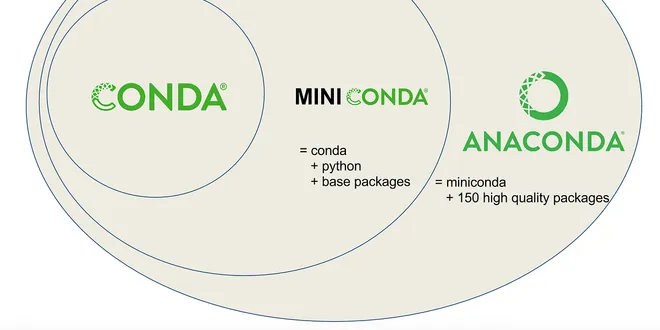Conda

Getting Started with Conda
Conda is an open source package and environment management system for data science and machine learning projects that runs on Windows, Mac OS and Linux.
📚 Read more at Towards Data Science🔎 Find similar documents

The Definitive Guide to Conda Environments
Conda environments are like cousins of Python’s virtual environments. Both serve to help manage dependencies and isolate projects, and they function in a similar way, with one key distinction: conda…
📚 Read more at Towards Data Science🔎 Find similar documents

From soup to nuts guide for setting up a conda environment
Hello! Conda is one of the most popular tools at data science community, and yet, it can be confusing to understand the steps and the cost of implementing that step, as there is hardly a single place…...
📚 Read more at Towards Data Science🔎 Find similar documents

Conda + Google Colab
Conda is the recommended environment and package management solution for a number of popular data science tools including Pandas, Scikit-Learn, PyTorch, NVIDIA Rapids and many others. Conda also…
📚 Read more at Towards Data Science🔎 Find similar documents

Introducing Conda Environments
Anaconda is a free distribution of the Python programming language. As the most popular Python distribution platform, it has over 30 million users worldwide. Anaconda makes it easy to install Python, ...
📚 Read more at Python in Plain English🔎 Find similar documents

Conda Development Environment for Python
Conda is an open-source package management and environment management system that can be used to create different, isolated coding environments. With Conda, you can create separate environments for sp...
📚 Read more at Python in Plain English🔎 Find similar documents

Conda: essential concepts and tricks
In this blog post, I will describe what conda is, and how to use it effectively, whether it is the first time you look at it or you are a seasoned user. While in the latter case many things will be…
📚 Read more at Towards Data Science🔎 Find similar documents

Anaconda: Introduction & Installation on Linux
Anaconda is one of several python and R programming language distributions which was formerly known as Continuum Analytics. It is used for scientific computing, data science, machine learning and…
📚 Read more at Python in Plain English🔎 Find similar documents

Publish a python package to Conda
Conda is a python package manager similar to pip. If you are working on building a python library then it’s highly likely you will be publishing it to Conda as well. Otherwise, Conda users won’t…
📚 Read more at Analytics Vidhya🔎 Find similar documents

13 Conda Commands for Data Scientists
Conda is the most common tool to create a virtual environment and manage packages for data scientists using Python. Unfortunately, it's not easy to find the most useful commands for using conda and pi...
📚 Read more at Towards Data Science🔎 Find similar documents

An Overview of The Anaconda Distribution
Anaconda is an amazing collection of scientific Python packages, tools, resources, and IDEs. This package includes many important tools that a Data Scientist can use to harness the incredible force…
📚 Read more at Towards Data Science🔎 Find similar documents

Don’t Let Conda Eat Your Hard Drive
If you’re an Anaconda user, you know that conda environments help you manage package dependencies, avoid compatibility conflicts, and share your projects with others. Unfortunately, they can also take...
📚 Read more at Python in Plain English🔎 Find similar documents


